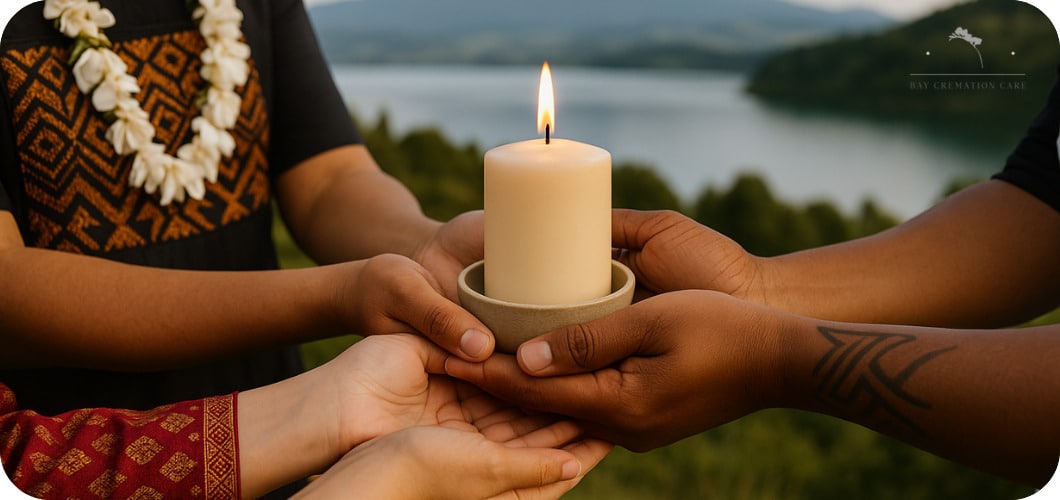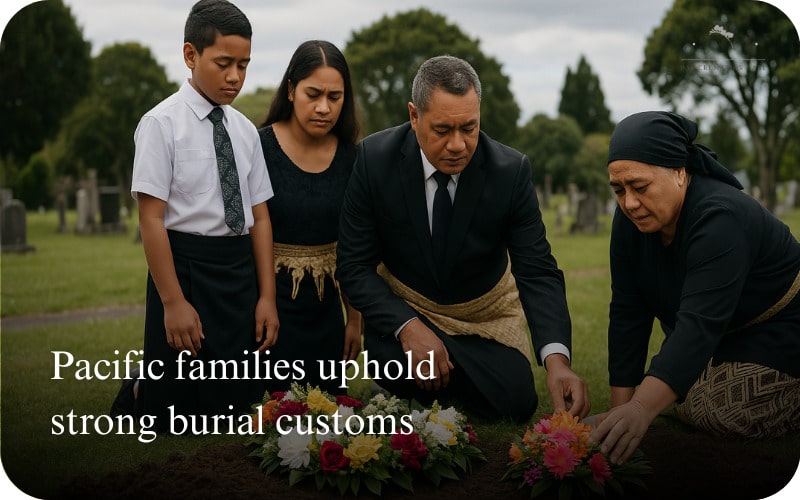
New Zealand is home to many communities, each with its own beliefs and customs around death. When it comes to cremation, perspectives vary widely. For some, cremation is familiar and accepted. For others, it may not be permitted or is only now becoming an option. These differences often reflect religious principles, cultural values, and practical considerations.
In this article, we look at how different groups across Aotearoa view cremation. We focus on Māori, Pacific Peoples, Asian communities, and others to understand how these perspectives shape funeral choices. By doing so, we can better understand the cultural foundation behind cremation and how it has changed over time.

Māori beliefs surrounding death are rooted in spiritual and cultural concepts passed down over generations. The body of the deceased, or tūpāpaku, is treated with great care and considered tapu (sacred). This belief is central to Māori funeral traditions, where tangihanga plays a central role.
It is customary for whānau to gather over several days to share stories, grieve together, and support one another.
Historically, cremation was not practiced. Burial allowed the tūpāpaku to be returned to the land, reinforcing the connection between people and their whenua (ancestral land). This was seen as an appropriate and respectful way to say farewell.
Over time, some of these practices have adapted. Urban living, space constraints, and cost have led some Māori families to consider cremation. While not universally embraced, it is now a more common choice in cities. When cremation is chosen, many still incorporate tikanga.
This may include karakia before the cremation, scattering ashes on family land, or holding a full tangihanga before the cremation takes place. These adjustments allow families to respect tradition while adapting to modern realities.
Some whānau also consult with kaumātua (elders) to ensure that spiritual processes are followed. Funeral directors who are aware of tikanga often provide better support, helping to bridge traditional values with contemporary needs.
This may include karakia before the cremation, scattering ashes on family land, or holding a full tangihanga before the cremation takes place. These adjustments allow families to respect tradition while adapting to modern realities.

Burial remains the preferred practice for most Pacific families living in New Zealand. Traditions vary by island group, but many cultures—including Samoan, Tongan, Fijian, and Niuean—view burial as an essential way to honour the dead.
These traditions reflect deep respect for ancestors, strong family connections, and spiritual values that extend beyond death.
In these cultures, funerals are often large events involving extended families, church groups, and community members. Burial allows for public mourning and provides a resting place that families can visit in the future.
Cremation, on the other hand, has often been viewed as culturally inappropriate or unfamiliar. However, practical needs are leading to slow changes. In urban centres like Auckland, some families have begun to explore cremation due to space shortages and funeral costs, as noted by the Ministry for Pacific Peoples.
These decisions are not made lightly. They typically involve church leaders, elders, and wider family discussions.
Some younger members of Pacific families are open to cremation, especially if it allows them to fulfil their duties without added financial burden. Respectful communication and support from knowledgeable funeral providers can help ease this transition while still honouring Pacific customs.

For many Asian communities, cremation is both accepted and expected. In Hinduism, cremation is an essential part of the farewell process. It represents the release of the soul and its movement toward spiritual freedom.
Families prepare the body with care, perform specific rituals, and often scatter ashes in flowing water or other meaningful places.
Buddhism also accepts cremation. In many Buddhist traditions, the body is burned to help free the spirit for its next life. Memorial services are often held after cremation, with offerings and prayers made over time.
Chinese families who follow Taoist or Confucian traditions may also use cremation. They typically set up home altars, conduct annual visits, and burn incense and paper offerings to remember the deceased. These practices are deeply meaningful and often require precise timing, ceremonial steps, and family participation.
In New Zealand, many families continue these customs with the help of culturally sensitive funeral providers. Providers that understand cultural funeral practices in NZ can offer services that match these needs, such as scheduling cremations based on lunar calendars or accommodating traditional mourning practices.
These practices help maintain continuity between old traditions and modern realities.
In Islam and Judaism, cremation is not permitted. Both faiths place a strong emphasis on the physical body and its return to the earth. Burial is required, often within 24 hours of death.
In Islamic practice, the body is washed, wrapped in a simple shroud, and buried facing Mecca. No embalming or cremation is allowed. Similarly, Jewish tradition calls for prompt burial with minimal interference. Cremation is seen as inconsistent with religious law.
Despite these strict rules, communities have adapted to life in New Zealand. Dedicated burial areas have been established in some cemeteries to meet these religious needs. Funeral directors work with imams and rabbis to carry out customs respectfully and efficiently.
Some funeral homes also coordinate transport for those who wish to be buried overseas. Support systems within both communities help ensure that traditions are preserved. Providers that acknowledge these religious obligations play an important part in upholding trust and maintaining spiritual integrity.
Despite these strict rules, communities have adapted to life in New Zealand. Dedicated burial areas have been established in some cemeteries to meet these religious needs. Funeral directors work with imams and rabbis to carry out customs respectfully and efficiently.
Cremation is not expected to be adopted by these communities in the future, as their beliefs remain firmly tied to burial practices. Respecting these positions is part of providing meaningful cremation and culture in NZ services that recognise all needs—even when cremation is not chosen.
Among those without strong religious requirements, cremation has become the most common choice in New Zealand. European and secular families often prefer cremation due to cost, simplicity, and flexibility. This shift reflects changing views about death and remembrance.
Cremation allows families to plan farewells that reflect personal values rather than formal tradition. Many people now choose to hold informal memorials, scatter ashes in special places, or keep urns at home. These choices are often less restrictive than traditional burial.
Environmental considerations are also part of this shift. Some people see cremation as a less land-intensive option, though discussions about emissions and sustainable alternatives continue. The option of direct cremation, without a service, has also become more popular for those who prefer simplicity.
This group has helped shape wider cremation beliefs in Aotearoa, where personal choice is now valued as highly as tradition. Funeral providers that offer flexible, transparent options continue to support this preference with professionalism and care.
This group has helped shape wider cremation beliefs in Aotearoa, where personal choice is now valued as highly as tradition.
The role of cremation services in New Zealand has changed significantly over the years. Providers now work with a growing number of families from different cultural backgrounds. Each family brings specific expectations, preferences, and ceremonial needs. Cremation providers must be prepared to meet these differences with care and respect.
This includes accommodating specific timings, allowing religious leaders to conduct rituals, and providing space for family gatherings. Crematorium staff may receive cultural training to better understand these practices.
Some providers offer transportation for ashes, support for repatriation, and multilingual communication to ensure families are comfortable throughout the process.
Bay Cremation Care, for example, supports families from all walks of life. Their team understands that no two services are alike. They aim to create respectful, simple farewells tailored to personal and cultural values.
Families are increasingly involved in how cremations are planned. By offering flexible options, cremation services make it easier for families to honour cultural beliefs. This might include choosing music and readings, inviting elders to speak, or integrating traditional prayers and garments.
Personalisation helps families stay connected to their heritage while adapting to life in New Zealand. Some choose to return ashes to home countries. Others use community spaces to hold prayer gatherings or memorial events.
Providers who understand cultural funeral practices in NZ play an important role. They allow families to make arrangements that feel right, without pressure to follow a fixed template. This approach helps ensure that all communities are respected.
New Zealand’s growing diversity is shaping how funeral services are offered. As more families seek help navigating cultural expectations, providers must offer both flexibility and reliability. This means giving space for tradition while also supporting new preferences.
Families may need guidance in understanding local laws, cemetery rules, or transport procedures. Funeral directors who communicate clearly and respectfully are best equipped to support them. Cremation providers are also finding new ways to include families in decision-making, whether by offering bilingual support or creating private spaces for prayer and reflection.
These efforts reflect a broader shift in cremation and culture in NZ, where choice, understanding, and care go hand in hand.
Cremation in New Zealand is not shaped by one belief or practice. It is shaped by many. From Māori funeral traditions and Pacific views on cremation to the customs of migrant families and secular preferences, the meaning of cremation continues to expand.
What remains constant is the desire to honour the dead with dignity. As funeral providers like our team at Bay Cremation Care respond to cultural expectations, cremation services become more inclusive, supportive, and respectful.
In this way, cremation is not just a method. It is part of how people express memory, heritage, and farewell—each in a way that reflects who they are and where they come from.
At Bay Cremation Care, we are dedicated to providing everyone with options for planning an affordable yet meaningful funeral service at our funeral home in Tauranga.
We are passionate about doing everything we can to give your loved one a beautiful, respectful, memorable farewell and alleviating your pain in this challenging time.
We believe that a funeral plays a vital role in offering closure and catharsis after a loss. That is why we will go out of our way to provide you with caring, attentive service.
Based in the Bay of Plenty, Bay Cremation Care has been offering the people of Tauranga and its surrounding areas compassionate care and support in their most challenging times. The company is run by Alistair Black, a fully qualified Funeral Director, Embalmer and member of the Funeral Directors Association of New Zealand (FDANZ) and NZ Embalmers Association.
